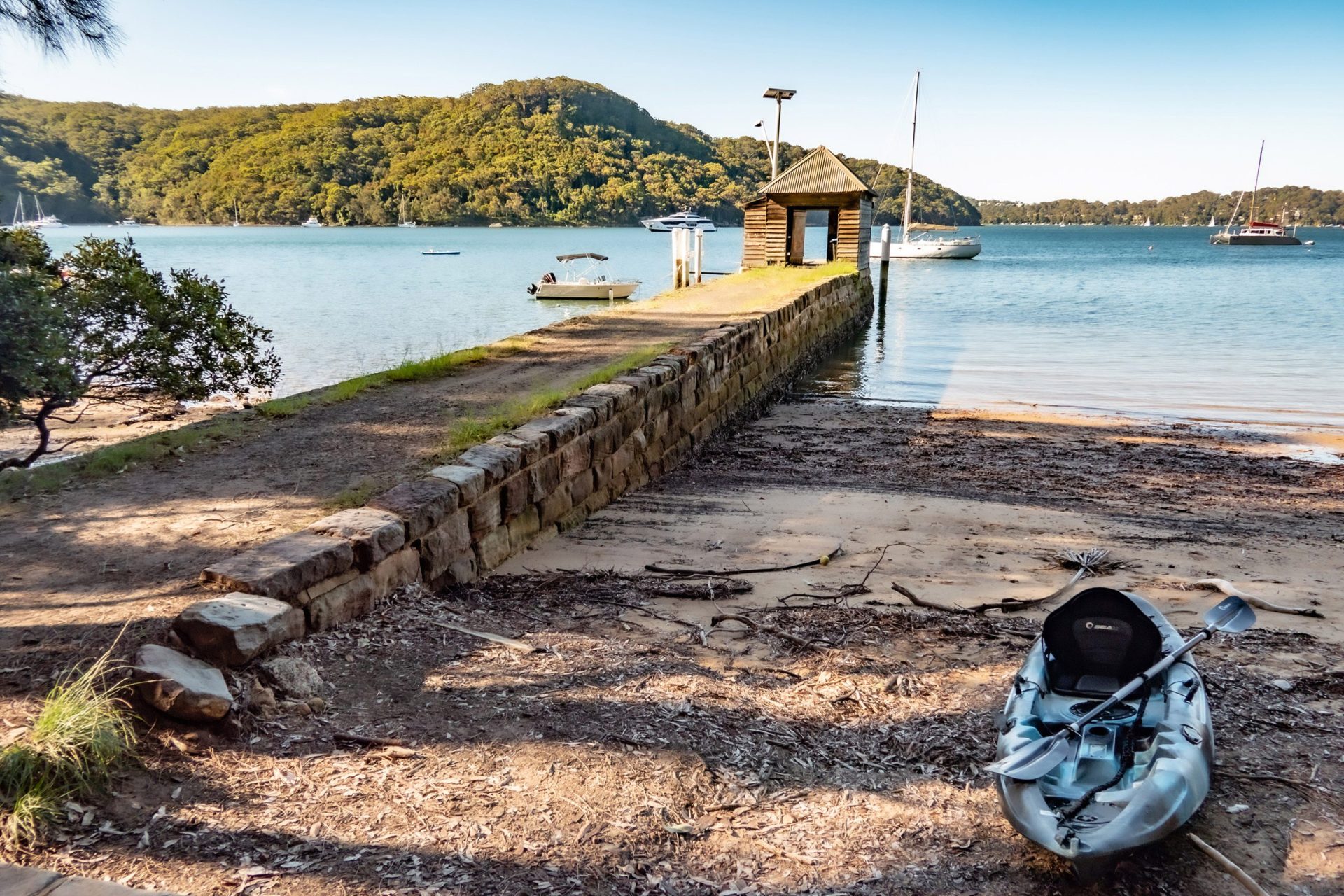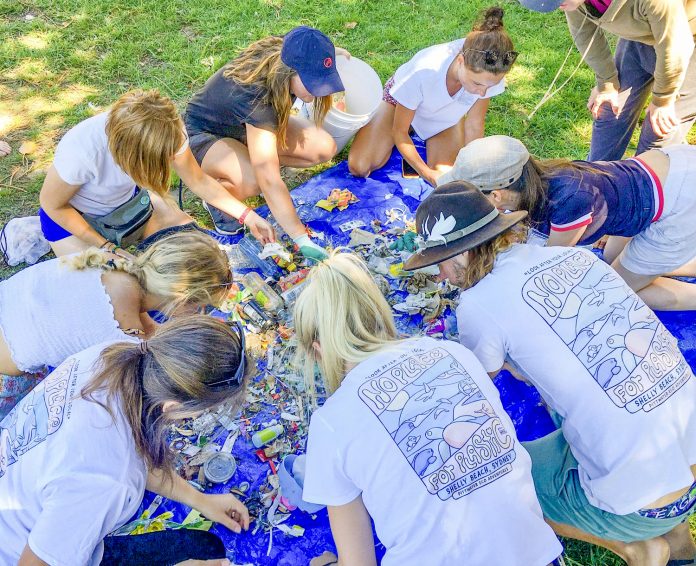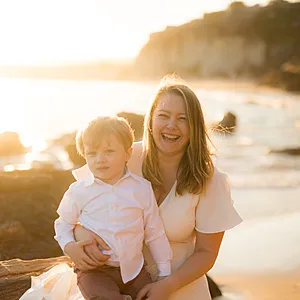Since June 2020, a local company called Pittwater Eco Adventures has hosted over 90 clean-up events, seeing a massive 1,680+ volunteers dedicate their time to removing plastic pollution from Manly Cove. Together they’ve spent more than 3,360 hours looking after our local beaches, waterways and bushland.
But who are they?
Run by dedicated activists Katie and Bergia, the two also manage the Pittwater YHA in Ku-Ring-Gai Chase National Park, where they host a range of activities and workshops for guests, corporate and group retreats and school classes.
To meet the dynamic duo, this reporter skipped the ferry and ventured by kayak through choppy, jellyfish-strewn waters from Church Point to Morning Bay. Because, why not?
So what’s it all about?
“We’re Pittwater Eco Adventures,” Katie said, introducing herself and Bergia, who between them have over a decade of experience in a range of invigorating pursuits, from managing adventure programs to teaching yoga and nutrition. They’re spirited and highly motivated, and sometimes they even finish each other’s sentences.
“We’ve been running a community clean-up at Manly Cove since June 2020. And recently we launched a recycling project called Reshaping Waste,” Katie explained.
“We work with a bunch of local schools; we’ll run a clean-up and then we will transform the waste that they find in the environment into other things.”

She elaborated: “We bought some machinery and set up a little mobile workshop, which is a small van that we can drive into schools and down to the beach.
“We host events in the Manly area. Basically, we rock up, run a beach clean-up, sort through all the different streams of waste that can be recycled, like sushi fish [soy sauce packets], straws and bottle caps, and then we’ll shred it all down.
“And we’ll get the people at those events to recycle on the spot – turn the waste they find into products that they can take home.”
Does that mean melting and remoulding the scrap plastic?
“Yes,” Katie confirmed. “We have a shredder, so we shred it all down into flakes. And then we put it into another machine, which melts it down and filters into a small mould on the machine. And so…”
“We make them into functional items!” Bergia intercepted. “At the moment we’re making carabiners – you clip your keys and things like that on them. But there’s a whole bunch of options. You can make games, whistles and other functional adventure items as well.”

Through hosting regular clean-ups, Bergia revealed a surprise factor that significantly influenced their own environmental awareness and the whole waste removal operation.
“Whilst we have been running these clean-ups, for about three years, we’ve also been collecting a lot of data about what was washing up and what were the top 10 items that we were finding.
“However,” she continued, “through gathering that data, even though it was useful to learn what people were throwing into the environment, we were still finding just as much every single week!
“What we realised is that while clean-ups are a really good way to get people together and see the waste issue hands-on, this plastic that we’re finding is going to be here for hundreds of years. We need to find a way of keeping that out of the environment. So that was sort of…”
“Why we came up with educating people about the importance of repurposing it…” Katie concluded.
Bergia continued, “We evolved beyond being able to turn that waste plastic back into functional items that remain within the circular economy, into an education programme, informing people on better ways to reuse their waste and recycling. If you’re dealing with kids, that’s really important…”
Katie added, “the reason why we started running clean-ups is because we wanted to physically connect people to the waste plastic issue. If you’re seeing it and touching it rather than just hearing about it, you’re more connected to it. And if you’re picking up waste items that you personally use at home every day, then you have that connection. You’re going to think twice about generating the waste in the first place.”

She continued, “the recycling is the next step beyond that. There’s a lot of barriers when it comes to recycling and I guess we just enjoy showing people how simple and easy it is to repurpose waste into functional objects.
“Like: ‘hey look, here’s three plastic lids that came from your milk bottles, and now it’s this – in 60 seconds!’ So, yeah, just having something really tangible, that people can see, they realise that it’s quite simple. They can connect the dots, rather than just be overwhelmed and worry, ‘oh, there’s nothing we can do, it’s such a big problem!’”
Partners in grime
Bergia revealed that their monthly Cove clean-ups involve the collaboration of other dedicated environmental organisations.
“We partner with two other organisations. One is called Operation Straw and they do an underwater clean-up. Often what you find underwater is quite different to what you find on the beach, so it’s really interesting to see what they’re collecting in the bay at the same time as we comb the beach.”
Operation Straw campaign against using single-use disposable straws and host snorkel dives, called ‘strawkles’, in which they retrieve as many waste straws they can find in the marine environment.
“And then there’s also another organisation called AusMaps,” Bergia said, “which is a like a citizen science project about microplastics, in which they’re measuring the microplastics they find.”
AusMaps describe their operation as “an ambitious coalition of school students, environment groups, universities and educators gathering critical new data about microplastic in our waterways. Using the data collected by our network of citizen scientists and researchers, AUSMAP is creating vivid maps of microplastic pollution hotspots around Australia. Our work will enable communities and government to implement behaviour change, regulate industry, and develop better waste management systems.”

Why Manly Cove?
“One of the reasons we run the events at Manly Cove,” Katie explained, “is because it’s in the top five most polluted beaches in Australia for microplastics!
“It is just physically the most polluted place that we have locally. And regardless of how many hours you spend cleaning up that beach area – we’ve spent over three and a half thousand hours cleaning it! – you’re guaranteed there will be more the next day, and the next day, and the next day.
“That’s because it’s connected to the harbour. It’s connected to the CBD. It’s connected to Parramatta River. So much waste plastic and other garbage in the water and much of it ends up deposited at Manly Cove.”
Katie continued, “the other reason we keep returning to Manly Cove is for gathering data. As Bergia was saying, accumulating information that we can send to Council and the NSW Government is really important to us. So, visiting the same beach site every month is a way of assessing data in a scientific way, rather than just picking random messy sites to clean.
“It used to be weekly – we ran 60 clean-up events in the first year – but now it’s monthly.”
How do they go about gathering the discarded plastic in the Cove?
“While Operation Straw go underwater with a snorkel,” Katie said, “we just use gloves and collect the bigger pieces. We have strainers as well, to get some of the micro plastics.
“At Manly Cove a Council tractor comes and sifts the top layer of sand for garbage. But we still find that, despite the tractor, there is still a lot of plastic pieces, especially under the surface. We find literally hundreds and hundreds of microplastic pieces!”
“That’s why we think it’s really good to bring people there,” Bergia added. “Because when you look out at Manly Cove, like pretty much anywhere on the Northern Beaches, you don’t see pollution like the type that appears in TV documentaries of foreign beaches, where you see like, 1000s of big plastic bottles and mountains of plastic waste.
“Instead, what you get is when you sit down in one spot, you could be there for an hour picking up tiny pieces of plastic. It is quite impactful for most people, because at first glance you can’t see it!”
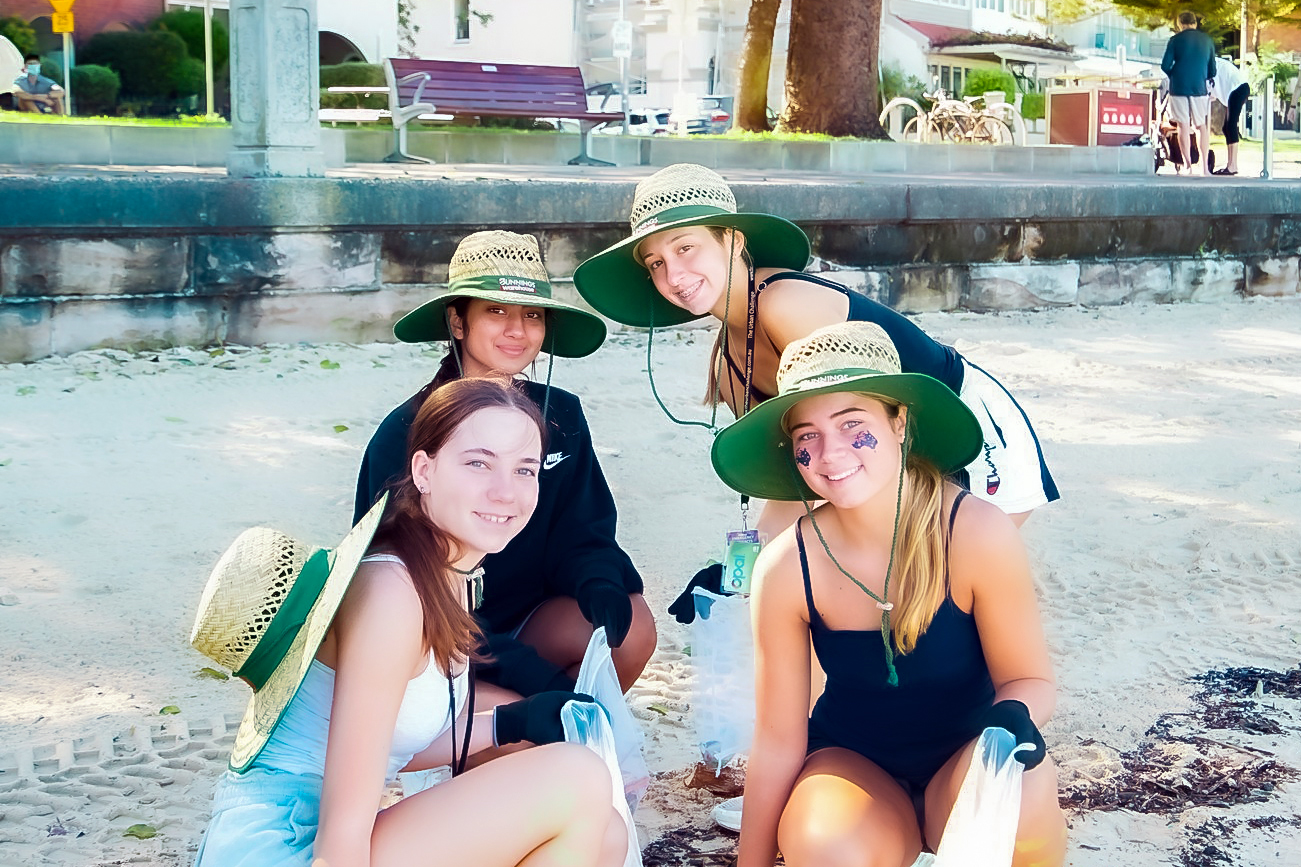
“It depends on the weather too,” Katie considered. “Sometimes we rock up and it’s just like what you’d expect: Coke bottles and chip packets and whatever else, everywhere, and floating throughout the water. Especially the morning after a storm or a strong southerly – the beach faces south – and what was previously floating probably 100 metres out has all washed up onto the shore.
“And then other days you go and it appears totally clean. But it’s not, the plastic waste is still there in a different form. We like to tell the students when we’re working with them: ‘it’s never that it’s not there, it’s just that some days it’s visible and some days it’s not.’
“And so, when there’s not heaps of garbage on the beach and it doesn’t look like it’s a massive problem, we get them to focus down on the microplastics in the sand. They’re always surprised; saying things like, ‘you’d have to excavate the whole beach to get rid of it!’”
Bergia recalled an incident involving a group of youths they were working with.
“Recently, when we were working with school kids, we found a plastic bottle cap that was from the 2000 Olympics. We asked these kids what year they were born, then showed them that this bottle cap, still totally intact, was created eight to ten years before they were born, and yet it’s still here today, unchanged. And if we don’t do something with it and remove it from the environment, it will still be here when these have kids, and their kids have kids…”
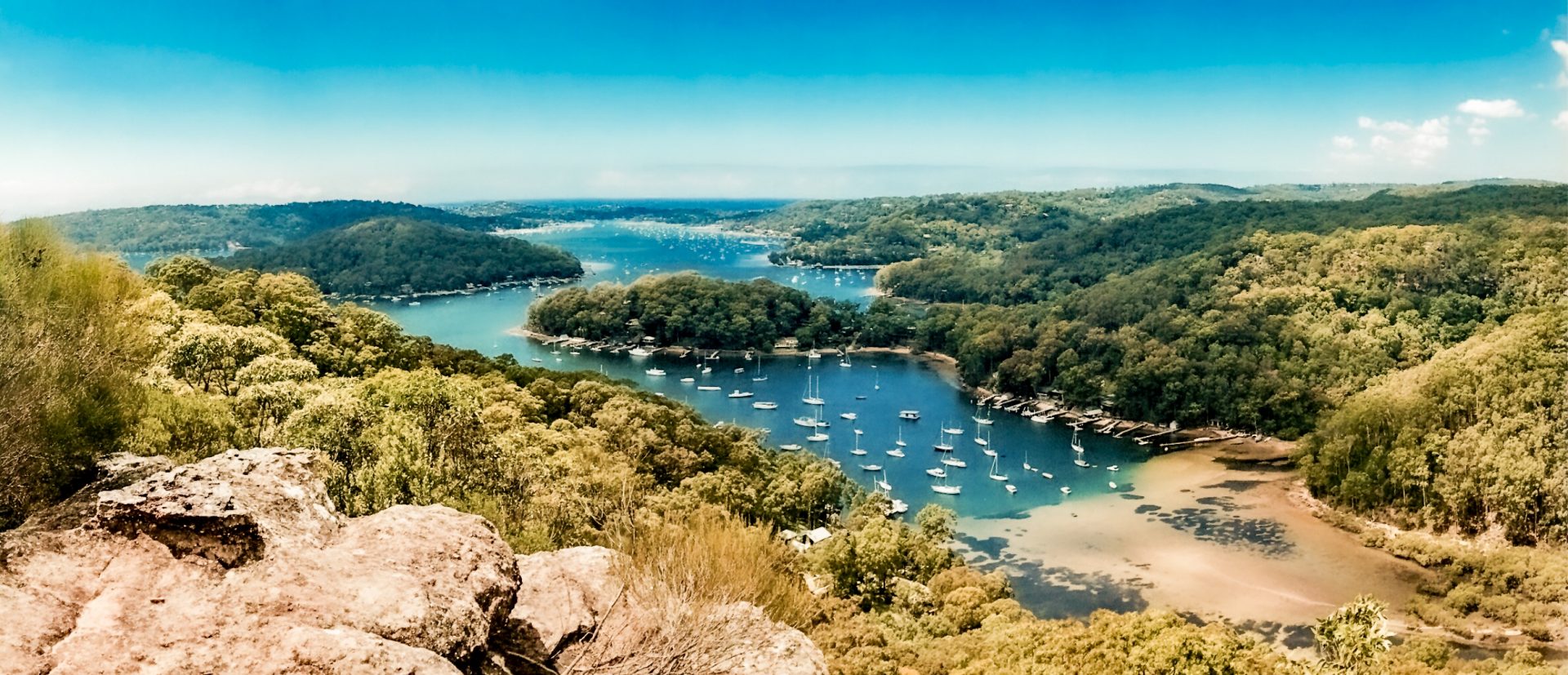
Morning Bay YHA
How does the Youth Hostel at Morning Bay in Pittwater tie into their environmental projects?
“The original YHA used to be across the bay,” Bergia revealed. “And then when Ku-Ring-Gai Chase National Park reclaimed that land, they had to dismantle the building. But the person who lived here [on the south side peninsula] was one of the founding members of YHA and really appreciated the opportunity for young people to be out in nature. So she donated her own house to be the new YHA hostel!
“This house is a very special location and it’s become a really great base for a lot of the stuff that Pittwater Eco Adventures do. The pillars of our company have always been Adventure, Conservation and Community – the greater Northern Beaches community.
“But being based here in the bush we also have access to amazing nature and I think that’s one of the best ways to get people connected to why we should try to protect the environment.”
She continued, “For example, there are Casuarina trees in front of the YHA, which glossy black cockatoos – the ones with yellow cheeks and orange and yellow tails – visit for food and to nest in. They’re super-fussy eaters but they really like Casuarina.
“However, they’re critically endangered, and they lost heaps of their natural habitat in the 2019 bushfires. So we’re really lucky to have them, as their numbers are declining. We play a part in preserving their numbers and people who stay here can observe them.
“And we’ve got swamp wallabies that come up to the lawn every day to feed.”
Bergia added, “plus, we also get to showcase a lot of the conservation things that we do here as well. We’re setting up our small-scale recycling workshop, which we’ll be able to take into schools. But those schools are also able to come out here, into nature, and do a workshop on site as well.

“We run the Duke of Edinburgh program in school holidays; we host school groups, retreats and things like that. Lots of different kinds of people come here to help with bush regeneration, whilst learning about native plants, Aboriginal culture and that kind of thing as well.
“And we also partner with the local Aboriginal-owned company, Bush to Bowl [which Manly Observer featured in January 2023], which host Connect to Country tours. So yes, our base has become the heart of what we do and what we’re about.”
“It’s a really good space for it,” Katie confirmed. “It’s not a hostel like other hostels in the city, there’s no nightlife, for a start! There’s no cars either, it’s boat access only. But it is perfect for groups and schools and people that want to sort of be immersed in nature and learn about our native environment.
“And you get here either by ferry or hike in, it’s a pretty easy 40-minute bushwalk.”
Check out their socials to find out when then next Manly Cove clean-up is.
Pittwater Eco Adventures
Website: https://www.pittwaterecoadventures.com/
Facebook: https://www.facebook.com/ecoadventurecrew/
Instagram: https://www.instagram.com/pittwater.eco.adventures/
From 1 September an Events Calendar will be available online to book activities, tours, retreats, etc.
